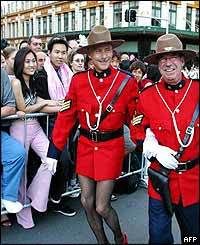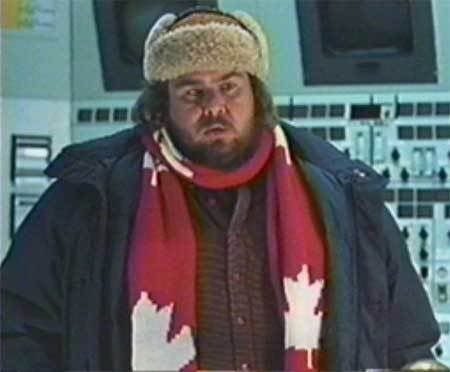| General Discussion Undecided where to post - do it here. |
| Reply to Thread New Thread |
|
|
#7 |
|
|
|
|
|
|
|
#8 |
|
|
|
|
|
|
|
#9 |
|
|
I think Ming would lose all power over Asher
rah would be constantly crying as some of those folks do things with ferrets that are unspeakable in the US of A DanQ is one of the nice ones, so he could maybe get Minister of Education, yeah I think so I would contact RCMP and find where my Buddy Blackice went to   We would all unit, wearing a Touque and adopt one national insult, HOSER  Posthumously thank John Candy for his intel on Canada  
|
|
|
|
|
#10 |
|
|
|
|
|
|
|
#13 |
|
|
You realize Canada would go a long way to ensure Republicans are never elected? What makes you say that? Suppose the Revolution occurred and Benedict Arnold's army successfully captured and held Montreal?
Canada would have spent about 120 years as a French Colony, 30 as a British colony, and 220 years as a part of the United States. The west would have been explored and settled much the same as the frontier down south. British Columbia would never have been their own colony, instead they would have been American right from the start. Given this outcome, it's unlikely that Canada's politics would be any different from the United States', and they would be considered an integral part of the US. |
|
|
|
|
#14 |
|
|
One problem on the US side of such an arrangement would be how the addition of Canadian provinces as states of the Union would have upset the delicate balance between slave and free states. The interesting thing is that there were only 4 colonies at the time. Quebec, PEI, Nova Scotia and Newfoundland.
It is likely if the US had successfully captured Quebec City in 1777, at the start of the rebellion, that there would have only been 3 states admitted, Nova Scotia, Newfoundland and Quebec, and instead of the 13 colonies, there would have been 16 states at the conclusion of the war of independence. Likely if all the British colonies were admitted, slavery would never have survived the constitution of the US, and would have been abolished from the get go. |
|
|
|
|
#15 |
|
|
|
|
|
|
|
#16 |
|
|
Undoubtably the NorthEast part of Canada (ie, anything to the East of Manitoba) and BC would be just as liberal, if not more, than the NorthEast US and West Coast. That's where most of the population is in Canada. So, yes, the country would have been far more left leaning.
Basically, the Republicans would have been more George H.W. Bush than George W. Bush. I still think Reagan would have arose due to specific circumstances of the time, but, like Thatcher in Britain, the country, after the crises of the age were over would have gone back to the left. |
|
|
|
|
#17 |
|
|
Undoubtably the NorthEast part of Canada (ie, anything to the East of Manitoba) and BC would be just as liberal, if not more, than the NorthEast US and West Coast. Why would that be? If the US takes over Quebec in 1777, then all the Quebec laws would be extinguished, and the colonies would be populated primarily by the 13 colonies, instead of the Loyalists.
As for BC, it's doubtful that it would ever have any British influence whatsoever. There's no reason why it would be any different from the rest of the Oregon treaty. The coasts have only become liberal in the past 40 years or so, heck California voted for Nixon. |
|
|
|
|
#18 |
|
|
Originally posted by Ben Kenobi
The interesting thing is that there were only 4 colonies at the time. Quebec, PEI, Nova Scotia and Newfoundland. It is likely if the US had successfully captured Quebec City in 1777, at the start of the rebellion, that there would have only been 3 states admitted, Nova Scotia, Newfoundland and Quebec, and instead of the 13 colonies, there would have been 16 states at the conclusion of the war of independence. Likely if all the British colonies were admitted, slavery would never have survived the constitution of the US, and would have been abolished from the get go. At the time of the signing of the Constitution only Massachusetts of the 13 former colonies outlawed slavery. Furthermore slavery had been legal in the British empire. Do you have any information to the effect that slavery was illegal in any of the Canadian provences prior to 1800? I doubt that the additon of Canada would have made a difference at the time of the signing of the US Constitution, but it might have after 1800. Significant tension between North and South began in the 1830's, but was countered by maintaining a delicate balance in the US Senate. If the addition of Canada meant an added 3 or 4 'free' states in the Union the South might have seceded. Had they done so I think their chances of success might have been higher. They probably would have added Texas to their number. The history of the Far West might have been greatly different. Would either the South or the North alone have been able to defeat Mexico and capture the Far West? Hey, we have a novel alternate history timeline going here. |
|
|
|
|
#19 |
|
|
Originally posted by Ben Kenobi
Why would that be? If the US takes over Quebec in 1777, then all the Quebec laws would be extinguished, and the colonies would be populated primarily by the 13 colonies, instead of the Loyalists. As for BC, it's doubtful that it would ever have any British influence whatsoever. There's no reason why it would be any different from the rest of the Oregon treaty. The coasts have only become liberal in the past 40 years or so, heck California voted for Nixon. It's not liberal because they were controlled by the British, silly. It was mainly due to demographics and industrial reasons. It isn't like the NorthEast US was any more conservative than Britain up until WW2. Oh, and you are talking about the Nixon who created the Environmental Protection Agency or OSHA? The Nixon who indexed Social Security for inflation and created the Supplemental Security Income? The Nixon who created the first significant federal affirmative action programs? What about the Nixon who called for a universal minimum income and UNIVERSAL HEALTH CARE?! Nixon belonged to a left leaning Republicanism that would find itself comfortably in the middle of the current Tory party in the UK. The type that would be in a US/Canada country. |
|
|
|
|
#20 |
|
|
Like I said, the Nixon that was for universal health care in the early 70s... but that he could get the Democrats on board about.
Remember (or maybe you don't) after Nelson Rockefeller retired, his faction of the Republican Party (now called "Rockefeller Republicans") was referred to as "Nixonians". Which is my point. Britain, parts of Canada and the US were pretty conservative And why exactly did Britain, Canada, and the NE US and the West Coast become left leaning? Could it have been things that they may have shared that the Southern US & Rocky Mountain US/Canada did not share? |
|
|
| Reply to Thread New Thread |
«
Previous Thread
|
Next Thread
»
| Currently Active Users Viewing This Thread: 1 (0 members and 1 guests) | |
|
|












 Linear Mode
Linear Mode


